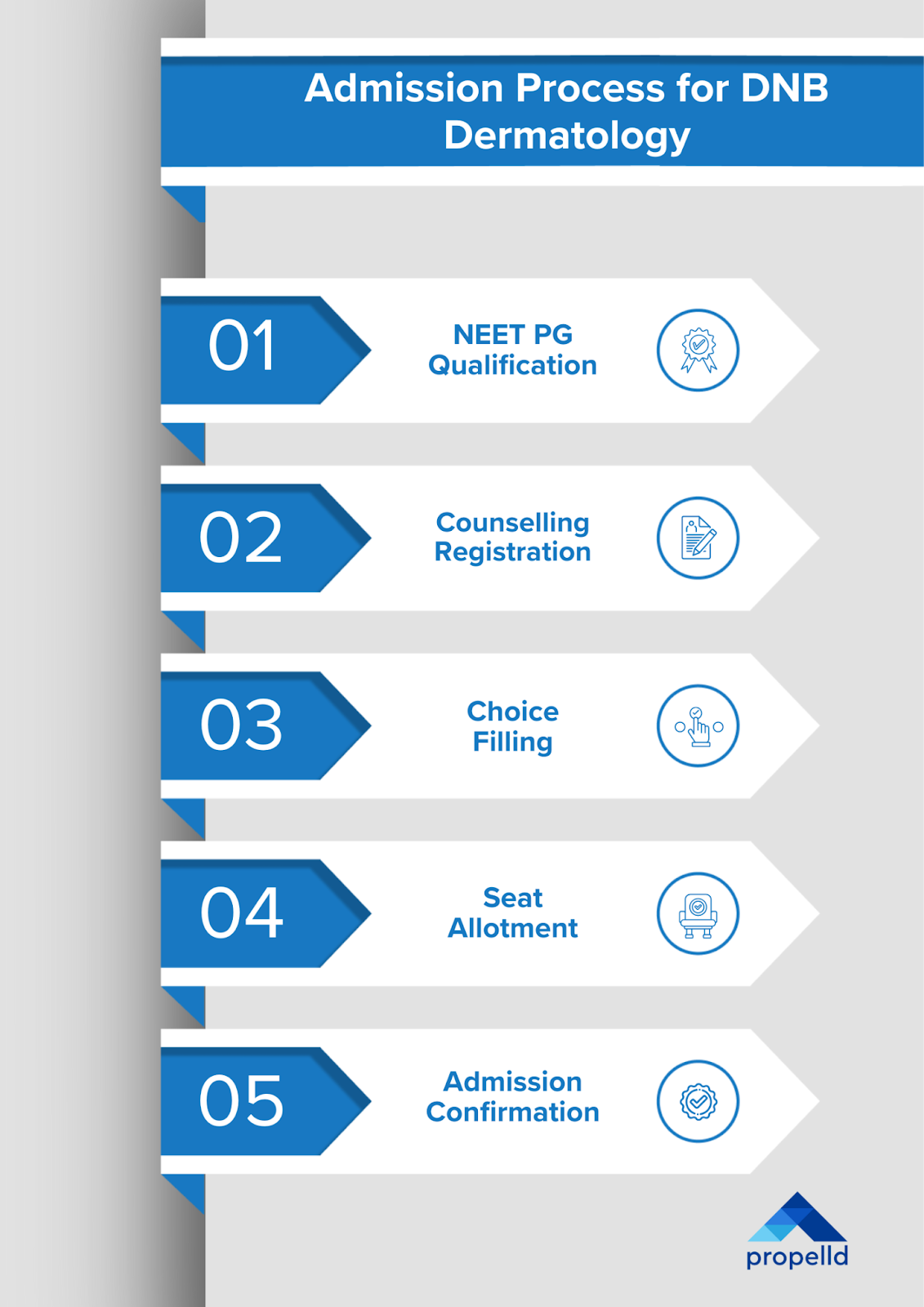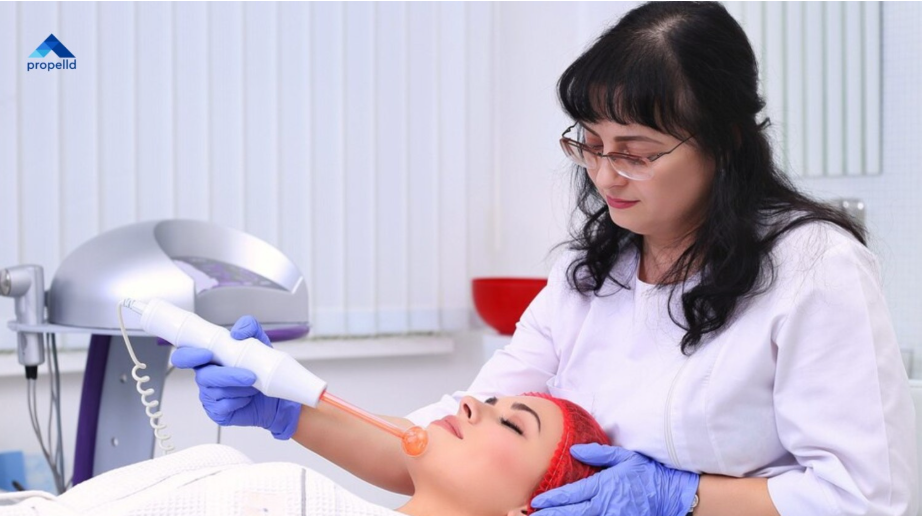The DNB in Dermatology represents one of the most competitive and sought-after postgraduate medical specialisations in India, offering doctors an opportunity to specialise in skin, hair, and nail disorders. With limited seats and tough competition, it’s important for aspiring dermatologists to know the key details about DNB Dermatology admissions, fees, and career prospects. DNB Dermatology admissions, fees, and career prospects become crucial for aspiring dermatologists.
This comprehensive guide covers everything you need to know about pursuing DNB in Dermatology, from eligibility criteria and admission processes to detailed fee structures, cutoff analysis, and future career opportunities. Whether you're preparing for NEET PG or exploring postgraduate medical options, this article provides in-depth insights based on the latest 2025 data and trends.
What is DNB in Dermatology?
DNB (Diplomate of National Board) in Dermatology is a postgraduate medical qualification equivalent to MD Dermatology, awarded by the National Board of Examinations (NBE). This specialised program focuses on the diagnosis, treatment, and management of skin, hair, nail, and mucous membrane disorders.
The course combines theoretical knowledge with extensive clinical training, preparing doctors to handle complex dermatological conditions, including inflammatory skin diseases, infections, autoimmune disorders, and cosmetic procedures.
Key Features of DNB Dermatology
Practical-oriented curriculum with emphasis on hands-on clinical experience
The research component is mandatory with the thesis submission requirement
Industry recognition equivalent to an MD qualification for employment and further studies
Flexible location options with programs available across multiple cities
Quality standardisation through NBE's stringent accreditation process
Career advancement opportunities in both clinical and academic fields
Get Education Loan for Any College in India.
DNB Dermatology Eligibility Criteria
The criteria are standardised across all NBE-accredited institutions to ensure quality and consistency, including an MBBS degree, completion of a one-year internship, and valid NEET PG qualification. Candidates must also have medical registration, and some institutes may ask for work experience, English proficiency, and character or fitness certificates.
Educational Qualifications
- MBBS degree from a recognised medical college in India or abroad
- Completion of mandatory rotating internship of one year duration
- Registration with Medical Council of India (NMC) or respective state medical council
- Valid NEET PG qualification with required cutoff marks for DNB courses
Age Criteria & Other Requirements
- Minimum Age: No specific limit beyond MBBS completion
- Maximum Age: Generally, no upper age limit (institution rules may vary)
- Relaxation: As per government norms for reserved categories
- Work Experience: Preferred but not mandatory
- Language: English proficiency required
- Medical Fitness: A Fitness certificate may be needed
- Character: Good conduct certificate required
DNB Dermatology Seats in India
Most exclusive medical speciality with only 14-19 total seats available nationwide, where Maharashtra leads with 3-4 seats. This ultra-competitive field offers just 2-3 seats in June sessions and 7-10 seats in November, making strategic planning absolutely critical.
Seat Distribution Overview
Here's an approximate breakdown of seats across different categories:
State-wise Seat Analysis
The distribution of DNB Dermatology seats varies significantly across Indian states, with major metropolitan areas hosting more programs. States like Maharashtra and Delhi NCR alone account for nearly 30% of the total seats, with top institutions located in cities like Mumbai, Pune, and Delhi.
NEET PG Cutoff for DNB Dermatology
The cutoff analysis provides crucial insights for candidates planning their NEET PG preparation strategy. The competitive landscape spans from elite ranks of 4,000 to accessible SC category positions up to 25,000. Historical data reveals consistent trends that help predict future requirements.
2024 Cutoff Analysis
Based on the latest available data, here's the comprehensive cutoff analysis for DNB Dermatology:
Historical Cutoff Trends (2020-2024)
Understanding the five-year trend helps candidates gauge the competition level and prepare accordingly.
The data shows a significant improvement in cutoff ranks for 2024, indicating either increased seat availability or changes in examination patterns.
Missing the ultra-competitive DNB Dermatology cutoffs? Explore Private Medical Colleges with Flexible Admission Criteria offering management quota seats, NRI quotas, and alternative pathways for aspiring dermatologists with moderate NEET PG ranks!
DNB Dermatology Fees Structure
The fee structure varies considerably based on institution type, location, and additional facilities provided. Understanding the complete cost breakdown helps in financial planning. The total 3-year investment spans ₹2.4 lakh to ₹9.45 lakh, making financial planning crucial for this prestigious specialty.
Additional Cost Components
Beyond tuition fees, candidates should budget for additional expenses throughout the program.
- Exam Fees: ₹15,000–25,000
- Thesis Submission: ₹10,000–15,000
- Accommodation: ₹30,000–1,00,000/year (city-dependent)
- Study Materials: ₹20,000–40,000
- Clinical Equipment: ₹15,000–30,000
- Conferences: ₹25,000–50,000
Get Education Loan - Minimal Docs. High Approval Chances.
DNB Dermatology Course Structure and Syllabus
The curriculum is designed to provide comprehensive knowledge and practical skills in dermatological practice. The curriculum progresses from foundation skills in Year 1 to advanced subspecialty rotations and independent research in Year 3.
Detailed Syllabus Structure
The syllabus covers both basic sciences and clinical dermatology to ensure well-rounded expertise.
Year 1: Foundation and Basic Clinical Skills
- Anatomy and physiology of skin, hair, and nails
- Histopathology of skin diseases
- Microbiology and mycology relevant to dermatology
- Basic clinical procedures and examination techniques
- Common skin conditions diagnosis and management
Year 2: Advanced Clinical Practice
- Complex dermatological conditions management
- Dermatosurgical procedures training
- Cosmetic dermatology principles and practice
- Pediatric and geriatric dermatology
- Research methodology and thesis planning
Year 3: Specialisation and Research
- Sub-specialty rotations (dermatopathology, cosmetic procedures)
- Independent patient management
- Thesis completion and submission
- Teaching responsibilities with junior residents
- Final examinations preparation
Admission Process for DNB Dermatology

The admission process follows a systematic approach through centralised counselling, ensuring transparency and merit-based selection. The systematic 5-step process requires strategic choice filling across typically 3-4 counselling rounds for optimal results.
Step-by-Step Admission Guide
The admission process typically spans 4-6 months from NEET PG results to final admission confirmation.
Step 1: NEET PG Qualification
- Appear for NEET PG examination conducted by NBE
- Achieve qualifying marks as per category requirements
- Obtain valid scorecard for counselling participation
Step 2: Counselling Registration
- Register online on the official NBE counselling portal
- Upload required documents including NEET PG scorecard, certificates
- Pay counselling fees as specified by conducting authority
Step 3: Choice Filling
- Research available programs and hospital preferences
- Fill choices in order of preference during specified dates
- Lock choices before deadline to confirm participation
Step 4: Seat Allotment
- Participate in counselling rounds (typically 3-4 rounds)
- Check allotment results published online
- Accept or reject allotted seat within specified timeframe
Step 5: Admission Confirmation
- Report to allotted institute within stipulated time
- Complete admission formalities and fee payment
- Submit original documents for verification
- Begin academic program as per institute schedule
Required Documents Checklist
Ensuring all documents are ready expedites the admission process and prevents last-minute complications.
- NEET PG scorecard (original and copies)
- MBBS degree certificate and marksheets
- Internship completion certificate
- Medical registration certificate (MCI/NMC or state council)
- Category certificate (if applicable)
- Identity proof (Aadhar, PAN, passport)
- Passport-size photographs (recent)
- Migration certificate (if changing states)
- Character certificate from previous institution
Ready to compete for those ultra-rare 14-19 DNB Dermatology seats? Get complete guidance on NEET PG Counselling 2024 including strategic choice filling, round-wise tactics, and document preparation to maximise your chances in this highly competitive specialty!
What Students Are Discussing About DNB in Dermatology
Social media platforms and online forums provide valuable insights into current student concerns and experiences regarding DNB Dermatology programs. These discussions reveal real-world perspectives beyond official information.
Here are some recent social media posts highlighting key concerns and experiences:
A Reddit user in r/indianmedschool posted:
"Opinions on DNB dermatology, based on future prospects and pointers to check before joining an institution.”
Insights: Students actively seek clarity on the future scope of DNB Dermatology and want to understand the quality of training before choosing a college. This reflects the importance of verifying institutional credibility, exposure to procedures, and long-term recognition before joining a DNB program in Dermatology.
Another Quora user posted in r/indianmedschool:
“I'm getting MD Pedia from KGMC and MD/DNB Derma in the peripheral colleges such Imphal or Bihar. I don't have any such preference towards any branch as long as it is non-surgical, but preferably want a good work life balance. Derma is better in that aspect but the colleges are too peripheral, which has got me confused. Any suggestions/opinions are welcomed."
Insights: When top-ranked MD options like Pediatrics from reputed colleges are available, many aspirants consider DNB Dermatology from peripheral institutes due to its better work-life balance and long-term earning potential.
What do we infer from the above cases?
- DNB Dermatology is preferred over some core MD branches for its work-life balance and career scope.
- Students are willing to choose peripheral colleges if the branch aligns with their goals.
- Institute reputation and clinical exposure are key concerns.
- The decision is influenced more by lifestyle and long-term prospects than just the degree type.
Pro Tip: If you're eyeing DNB Dermatology, prioritise institutes with strong clinical exposure, even in peripheral locations, and weigh long-term lifestyle and earning potential over just the degree tag.
Struggling to evaluate peripheral colleges for DNB Dermatology training? Our comprehensive guide on How To Choose a Good Medical College helps you assess clinical exposure, faculty quality, infrastructure, and long-term career impact before making this crucial decision!
Career Prospects and Future Scope
The industry for DNB Dermatology graduates offers diverse opportunities across clinical practice, research, and specialised services. Understanding these prospects helps in making informed career decisions. The specialty offers diverse paths from private clinic establishment to emerging opportunities in cosmetic dermatology and telemedicine consultations.
Employment Opportunities
DNB Dermatology graduates can pursue various career paths depending on their interests and specialisation preferences.
Clinical Practice Options:
- Private clinic establishment with dermatology specialisation
- Hospital employment in dermatology departments
- Multi-specialty clinic associations and partnerships
- Telemedicine consultations and digital health platforms
- Medical tourism services in cosmetic dermatology
Academic and Research Roles:
- Teaching positions in medical colleges and institutions
- Research scientist roles in pharmaceutical companies
- Clinical trial coordination and management
- Medical writing and consultation services
- Healthcare policy development and advisory roles
Salary Expectations and Growth Potential
Understanding earning potential helps graduates plan their career trajectory and financial goals effectively. For instance, dermatologists in clinical practice can earn ₹25–50 lakh annually within 5–10 years, while those with over a decade of experience may exceed ₹50 lakh per year.
Preparation Strategy for DNB Dermatology
Success in securing DNB Dermatology admission requires strategic preparation and a thorough understanding of competition patterns. The ultra-competitive selection with a structured 12-15 month preparation framework emphasising high-yield dermatology topics.
NEET PG Preparation Framework
Achieving the required cutoff ranks demands focused preparation with emphasis on high-yield topics and consistent practice.
Study Plan Structure:
Foundation building (4-6 months): Basic sciences and clinical subjects
Advanced preparation (4-6 months): Subject-wise deep diving and case studies
Revision phase (2-3 months): Practice tests and weakness areas
Final preparation (1 month): Mock tests and confidence building
High-Yield Subjects for Dermatology:
Dermatology (obviously the most important)
General Medicine (systemic conditions affecting skin)
Pathology (skin histopathology and laboratory medicine)
Microbiology (infectious skin diseases)
Pharmacology (dermatological medications)
Counselling Strategy
Effective counselling strategy maximises chances of securing preferred seats while maintaining backup options.
Choice Filling Tips:
- Research thoroughly about hospitals and their dermatology departments
- Consider location factors including cost of living and practice opportunities
- Maintain backup options with other clinical specialties
- Understand round-wise strategies for optimal seat securing
DNB Dermatology offers a rewarding and financially promising career for those passionate about the field and prepared for its competitive nature. Success requires strategic preparation, informed decision-making, and persistence. Aspiring candidates should research programs, seek guidance from practitioners, and plan thoroughly to make the most of this dynamic medical specialty.
Propelld supports your medical career goals with tailored education loans designed for aspiring specialists like you. Start your DNB Dermatology journey with flexible financing that fits your plans,powered by Propelld.










.svg)